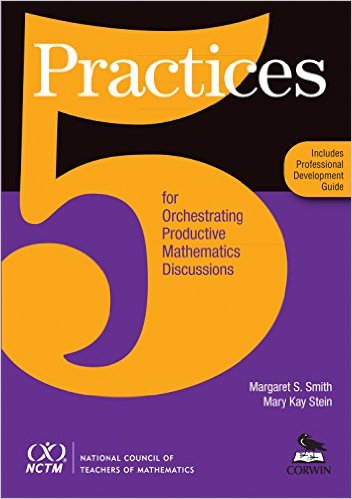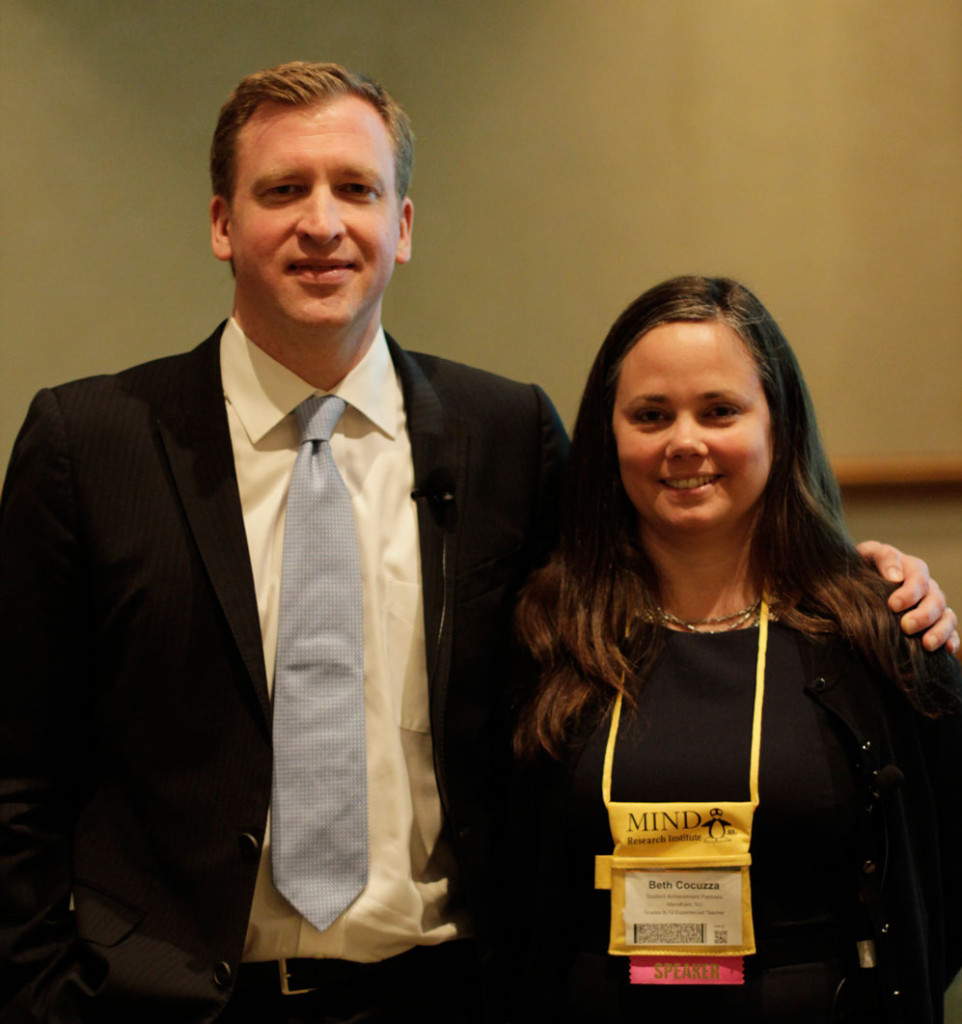 One of the challenging aspects of the Common Core State Standards for Mathematics are the SMP’s (Standards for Mathematical Practice). NCTM had similar process standards for years and sometimes I wonder how many people even knew they existed. So, how do we implement the practice standards? How do we ensure that they gain traction in our practice? One way is through math talk which supports various SMP’s, but clearly addresses #3 – construct viable arguments and critique the reasoning of others. For this to occur there has to be communication, which can take many forms, but kids love to talk. The question is how do we plan for purposeful talk? 5 Practices for Orchestrating Productive Mathematics Discussions by Margaret M. Smith and Mary K. Stein is a worthwhile read if you are interested in this topic. The authors present a framework that addresses how to plan for student responses during classroom discussions. The framework includes 5 specific practices: anticipating, sequencing, monitoring, selecting, and connecting. The 5 practices translate directly to a deliberate planning approach that supports more purposeful discussions. At a little over a hundred pages it’s a quick summer read that directly adds to your teaching tools. I strongly recommend this book. You can find the book at NCTM’s website here.
One of the challenging aspects of the Common Core State Standards for Mathematics are the SMP’s (Standards for Mathematical Practice). NCTM had similar process standards for years and sometimes I wonder how many people even knew they existed. So, how do we implement the practice standards? How do we ensure that they gain traction in our practice? One way is through math talk which supports various SMP’s, but clearly addresses #3 – construct viable arguments and critique the reasoning of others. For this to occur there has to be communication, which can take many forms, but kids love to talk. The question is how do we plan for purposeful talk? 5 Practices for Orchestrating Productive Mathematics Discussions by Margaret M. Smith and Mary K. Stein is a worthwhile read if you are interested in this topic. The authors present a framework that addresses how to plan for student responses during classroom discussions. The framework includes 5 specific practices: anticipating, sequencing, monitoring, selecting, and connecting. The 5 practices translate directly to a deliberate planning approach that supports more purposeful discussions. At a little over a hundred pages it’s a quick summer read that directly adds to your teaching tools. I strongly recommend this book. You can find the book at NCTM’s website here.
Tag Archives: why and z math
Common Core with Jason Zimba
I was looking forward to this session since I saw that Jason Zimba would be presenting at NCTM this year. He’s one of the lead writers of the Common Core State Standards for Mathematics and I was curious to see what light he would shed on the standards. Zimba and his co-presenter Beth Cocuzza gave a brief history of the CCSSM and how the standards were created. They also highlighted some of the resources available on their site for evaluating CCSSM alignment. My biggest take away was the free resources provided at http://www.achievethecore.net where you can find most of the resources from their session.
Here are my 3 favorite resources from their site:
1) Summary of the shifts (focus, coherence, and rigor). This is helpful for parents, teachers, coaches, and administrators to understand how Common Core is different. The rest of the resources on the site typically connect back to one of the three shifts. Zimba explained that the focus of the standards gives the space for the eight mathematical practice standards to be addressed. This made a lot of sense. He also explained that the coherence across grade levels meant that each year students should be adding on to their current understanding of topics rather than seeing ideas as brand new. The summary of the shifts can be found here.
2) Practicing with the Shifts handout provides exercises for better understanding each shift. In the focus exercise you are asked to narrow down the focus of grades K-8 by eliminating 1 out of 3 provided topics for each grade level. There’s an answer key provided here. In the coherence exercise you essentially go on a “standards hunt” to find all the standards that relate to a topic across grade levels. Fractions is the specified topic in the exercise, but I could see this being done with any topic: addition, geometry, measurement, etc. This is a valuable exercise in collaborative teams (or across grade levels) to get familiar with the coherence within and across grade levels. There’s also a section where you’re able to explore what’s meant by rigor in the CCSSM. The practice handout can be found here.
3) Focus by Grade Level documents. These documents provide a 2 page synopsis of individual grade levels. Each document defines the major, supporting, and additional clusters (of standards) for the grade level. It’s recommended that 65 to 85 percent of time be spent on the major clusters at each grade level. Also, the required fluencies for each grade level are highlighted. The back shows the clusters of standards that lead to 8th grade algebra. I really like these documents because they give a brief, but concise snapshot of each grade level and also inform teachers where their instruction fits within the big picture of the standards. The Focus by Grade Level documents can be found here.
Overall, the presentation was very informative. It didn’t get into the day to day details of what the standards look like in practice, but provided some excellent resources for anyone looking to better their understanding of the structure and purpose of the standards. Also, there are many other resources available at http://www.achievethecore.net.
It’s Been a While…
The annual NCTM conference starts tomorrow and I’m excited to attend this year. The last time I was able to attend the conference was in 2003 in San Antonio, TX. This was also my first year teaching. I remember feeling honored to have the opportunity to attend as a first year teacher and it really set the stage for my passion for teaching mathematics. I’m really looking forward to this year’s conference, especially with the shifts associated with Common Core. I’ll be recapping some of the sessions I attend and sharing as much info as possible in my posts. A couple that I’m really looking forward to are:
“Key Words Help,” “Inquiry Won’t Work,” and Other Myths (Speakers: Alexis Dixon and Juli Dixon)
Evaluating Alignment to CCSSM: How Do Your Resources Rate? (Speakers: Beth Cocuzza and Jason Zimba)
Why and Z(ack): An Introduction
So, why the z? My name is Zack. Zack Hill. I’m a math staff developer for grades K-5 in a school district in the Tampa Bay Area. Prior to this I was a classroom teacher for 11 years and spent most of my time in grades 3-5. I’m married and have two children, the oldest of whom is getting ready to start kindergarten in the fall.
So, why the why? I’m a curious individual. I love to learn as much as I love to teach. I started this blog because there are so many questions about teaching elementary mathematics that are worth exploring. Why is the teaching and learning of mathematics important? Why is it important for students to understand mathematics conceptually as well as procedurally? Why are there such different perspectives on the Common Core Standards for Mathematics? What does teaching to the Common Core Mathematics Content and Practice Standards look like? What specific resources and practices support students in becoming proficient in the standards? What supports are available for teachers who are navigating the standards? How do I best support students in making sense of complex mathematical ideas? In the Summer of 2012 I earned my Master of Education in Curriculum and Instruction from the University of Florida. There was a heavy emphasis on teacher inquiry as a practice of deliberate examination and reflection of one’s teaching practice. Writing allowed me to solidify my ideas and pushed me to think about specific actions I could take to support my students. I hope to continue that work here. I may not have a clear cut answer for every question I will pose and discuss, but I will make this a place where a dialogue can continue about some of the thought provoking questions about teaching mathematics.


